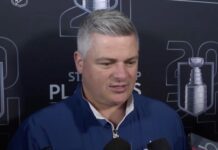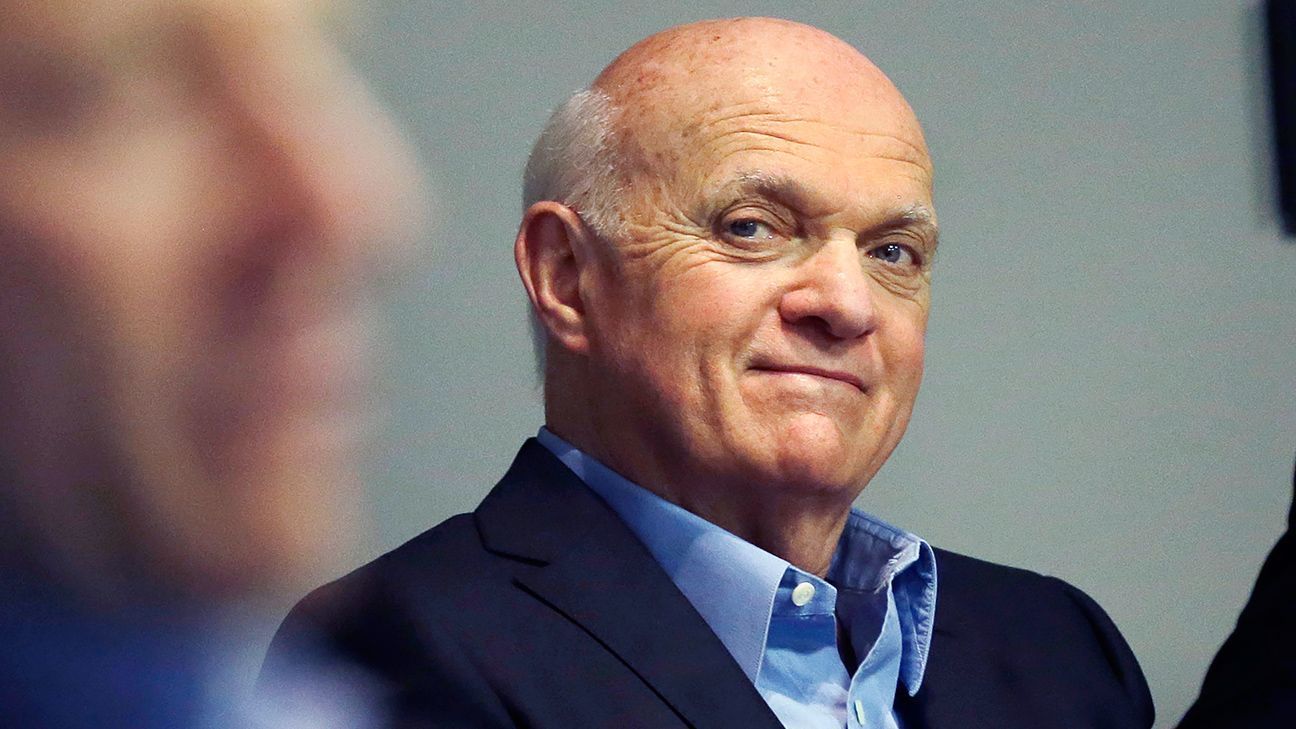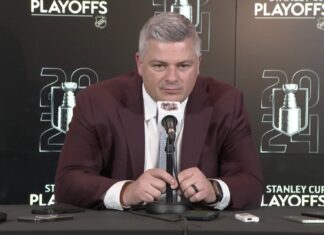Toronto Maple Leafs’ General Manager, Lou Lamoriello, was on Prime Time Sports talking about the team and the progress of the rebuild.
How have the first few months on the job been, understanding what the initiative was when you got here? Has it been pretty much as expected?
“We have to do some things, there’s no question, but I think the foundation has been laid”
– Lou Lamoriello
Lou Lamoriello: Yes it has. I don’t think there’s been any surprises. I think the vision that Brendan had when he spoke to me during the summer, and my conversations with Mike, everything has been exactly what we said. In saying that, we certainly would like to have, like everyone else, more wins. But what the plan has been, with the development of the young players in the minors and getting them to do the things that are necessary to prepare them for the NHL, fortunately we have an outstanding team [in the Marlies] that is winning and players are getting used to winning as young players. And then the job that Mike has done here with the Leafs in bringing in a system and getting a commitment from the players to buy in, to work each and every night. I think, in saying all that, having the draft picks that they’ve acquired prior to me, having Mark Hunter out there day in and day out with his staff, I think that everything is on schedule. We have to do some things, there’s no question, but I think the foundation has been laid and it’s just [about] maintaining it and not getting off track.
You mentioned the minor league system. The Marlies have had an extraordinary year. It’s their best year ever, at least to this point. They are the best team in the AHL by a significant margin. They’ve played extraordinarily well. But how do you quantify that as an NHL GM, where the real emphasis is the one or two or hopefully a few more guys that have the potential to play in the NHL on that team. Is that the total focus, or is there tangible benefit long term to, as you say, winning environment that’s being created there?
Lamoriello: There is no question there is tangible and intangible benefits. We’ve seen this over the years where a player will go to the minors and play extremely well, you’ll bring him right up, but he might not be mentally prepared for the pressures that come with that, the expectations of coming from what he did in the minor leagues. It’s a different league. You really never know. I’m glad you used the word potential, because that’s the first thing you have to have is potential. Then you have to see how you can develop that and how you can get that to the highest level. I think that’s what has been most pleasing to me. We have stuck with what we planned to do, which sometimes is very difficult. You have an injury here in the NHL and you know you’ve got a player who can help you there, but it’s not good for his overall development as far as the big picture of where you are. There are several players there that, in my opinion, will play in the National Hockey League. To what level they will have success, we’ll only find that out when we get there, but we’re giving them every bit of a foundation and development process to maximize that and give them the best chance of success.
William Nylander hasn’t played since the World Juniors. I believe the plan is to play this weekend in a game. Has your plan for William going forward been altered by him sitting out the last month or so?
Lamoriello: No, I don’t think it’s been altered. You’re right – he will be back in the lineup. The most important thing was making sure that he was 100%. Even when you get a player 100%, you always wait a little while longer because they tell you they feel good… You know, A to Z. But the plan was exactly the way it’s been. At the appropriate time, I’m sure you’ll see William Nylander like you’ll see a few other players.
How would you categorize the level of conversations you’re having this year as compared to all those years in New Jersey? Is it active, is it quiet?
Lamoriello: I think you always have conversations, no matter what side of the fence you’re on. Whether you’re looking to acquire players [or not], you’re making sure you understand what is transpiring throughout the league. I would say the conversation for any GM should always be active at this time of year no matter what position you’re in to make sure you have an awareness, have a knowledge of the needs of everybody.
You have a plan. It is a multi-year plan. The emphasis is not to pull the trigger on anything that would disrupt the plan because we’ve seen that play out before, where a general manager comes in and thinks he’s got a better team than maybe he does, and so the four-year plan becomes, “well maybe if we do this and this, we can expedite this whole situation.” And more often than not, you would concede, that doesn’t work. In the course of executing this long-term plan, are there short-term aspirations? Have you talked about, “well what if a guy became available and we really don’t need him yet, we’re building a little bit more slowly, but he’s the kind of guy we might not be able to get two or three years down the road when we think we’re a capable hockey team?” How do you deal with those intangibles?
Lamoriello: I think you deal with them like you deal with everything else. What is in the best interest of the overall plan to get where you want to get without compromising or putting yourself back, whether it’s today, tomorrow or the next day? I’ve always said that that I’ve always had a five-year plan in my mind that changes every day because of a lot of sets of circumstances. It could be injuries. It could be anything that pushes you to do something – not pushes you, but makes it the right thing to do. I think that’s the most important thing. When time is on your side, when you have the type of people we have here who are constantly looking at all positives and negatives, then you make the right decisions. Sometimes, and not always, it’s better to be a little late whether it’s bringing a person up or trying to push the envelop as you said earlier where maybe you could expedite something. Because short-term plans never work.
Sometimes long-term plans don’t work, either.
Lamoriello: Absolutely. That’s why there’s such a balance. When you make a short-term plan, you should always make it because you feel you have a chance of winning the Stanley Cup.
Young players – some… many… maybe all of whom aren’t with the Toronto Maple Leafs today – will be integral in the ability to win in the years to come. We have seen organizations have success with young players who they nurture through their system. We have seen teams have numerous high draft choices who haven’t found success. And one of the arguments for the teams that didn’t succeed is that they weren’t surrounded with sufficient experience to nurture them at the NHL level. Are you a believer in that? Are you a believer that you have to have a few guys that have been to the rodeo before in order for those young players to develop?
Lamoreillo: Absolutely. I believe that you have to have a supporting cast. I don’t think there’s anyone who would question that or should question that. You have to have players who will give the right example, will give the right work ethic, will give the right sort of away-from-the-arena attitude that it takes and sacrifices it takes to have success. There’s no question that that’s a necessity.
The word in Toronto has always been that the fans would not sit through something like this, that the media wouldn’t let a GM have this slow of a rebuild. Has it been challenging for you to stick to your guns, or is this just been the way it goes for you through 48 games with the Leafs?
Lamoriello: I think it’s been challenging for all of us here, whether it’s Mike, Brendan or myself, or anyone else who has had the good fortune of winning. There is always that temptation to push that gas pedal. I think we’ve all been around long enough to know what is right. When one might be a little more anxious then the others can pull him back. I think we’ve all stayed on the right course. It does get difficult at times, I won’t apologize for that, but anything easy isn’t worth it.
When you look at 11 goals in the last 9 games for you guys… Do you get together and talk about that, ways to improve that from within? Are some guys tempted to go and get something from the outside to improve that?
Lamoriello: There’s no question. No one has to remind any of us that we haven’t been scoring or we haven’t won in our most recent games We know that. Certainly it’s a conversation each and every day, to do whatever is necessary to get better while not sacrificing what we’re doing to get where we want to get.
Is that tougher on you or is it tougher on the guy behind the bench, Mike Babcock, who has to try to get this group to score?
Lamoriello: I think it’s certainly tougher on the coach. I think we’re extremely fortunate here in Toronto. In my opinion, we have the best coach in the game here. His enthusiasm, the way he teaches and the way he can come to work each and every day, no matter what transpired the day before, no matter what the play was, and to energize these people… we have the right person. But Mike is a winner, and whenever you win these type of things certainly are not something you take lightly, but that’s the constitution you have to have to go forward.
Who is more likely to pull the other one from the ledge when things aren’t going well? You with Mike, or Mike with you?
Lamoriello: I think we’re all the same. It’s interesting, but I think the three of us have similar personalities and competitiveness, but I think we’ve been around, hopefully, long enough to know what the right thing is.
It’s hard not to have been a fan of Babcock and understand how good of a coach he must have been in his previous tenures, but I’ll tell you – and it’s not results oriented, obviously – but I’m incredibly impressed with this guy, as a guy and as a coach. Has anything happened this year with Mike that has surprised you? Are you surprised that he’s as good at what he does as he is?
Lamoriello: I had not worked with Mike on a day-to-day basis, but certainly I admired his work from afar and watched how his teams prepared. As you know, we were in a Stanley Cup Finals together when he was in Anaheim. So I had the opportunity to watch him over the period of seven games and some-14 days of practices. I had an awareness. I also had players play for him in the Olympics. So I had a lot of knowledge, but what I did not know about him is the type of energy he has and how it spreads throughout his staff and how he can come to work the next day, no matter what transpired the night before, and you would never know that something didn’t go the way you’d like to see it. I have tremendous respect for that. The most difficult job in the game is coaching. There is no question about that. I guess the biggest thing is this – being able to recover from something not going as well and coming to work. I think that is a trait that is so, so important to players, no matter what position they may play — that you cannot do anything about what just transpired. You can learn from it, and don’t let it affect what you have to do today.
There is a player on your roster that has impressed you, and over the years he’s taken a lot of heat in Toronto. This year he doesn’t seem to be taking any heat, but media members don’t seem lined up to praise him. Dion Phaneuf: What have you seen from him this year? In the past, people would take shots at him. This year people aren’t taking shots at him, but maybe he should be getting a little more praise instead of nothing at all.
Lamoriello: You always hear these different things, and I did not know Dion personally. I certainly played against him but didn’t know him here in Toronto other than hearsay. You come in with no preconceived notions, and boy am I glad I did. This man has extremely impressed me in watching how he’s handled the young players, watching him and how his work ethic has been, watching him and how he’s handled the media, and also knowing everything that he went through – I can’t even imagine. He’s been one of the most impressive individuals I’ve been around here this year with the leadership qualities he’s shown me – they’re certainly not to impress, they’re genuine. You can read right through that. He’s impressed me and I’m glad you mentioned that because I would not have brought it up, but he deserves that accolade right now.


































